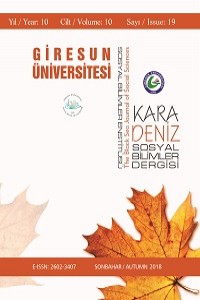Öz
Bu çalışmada özel eğitim ve rehabilitasyon
merkezine devam eden fizik hastalarının egzersiz yapma durumlarının
belirlenmesi amaçlanmıştır. Çalışmada nitel araştırma yöntemlerinden anket
yöntem kullanılmıştır. Çalışmada incelenen 40 rehabilitasyon hastasının,
ailelerinin %40’ının evde terapötik egzersiz yaptırmak için eğitim almadığı,
%37.5’unun evde egzersiz yapmak için yeterli olduğu fakat yapmadığı, %10’unun
ise egzersiz yaparken kendini kötü hissettiği saptanmıştır. Ailelerin
%12.5’unun çocuklarının evde egzersiz yapmak için yetersiz olduğunu düşündüğü
görülmüştür. Bireylerin %5’ine evde egzersiz yapamamakta mental bozukluklar da
eşlik etmektedir. Evde egzersiz desteği veren aileler %82.5 olarak
oranlanmıştır. Onların da %40’ı haftada bir egzersiz yaptırmaktadır. Bireylerin
%92.5’unda rehabilitasyon eğitimi sonucu ilerleme kaydedilmiştir; ancak bu
ilerlemeler çok yavaştır, uzun süreler sonrasında görülebilmektedir(%67.5).
Verilen cevaplara göre ailelerin terapötik egzersiz desteği konusunda yeterli
bilinçte olmadıkları görülmüştür. Hastalara gerekli egzersiz desteğinin
sağlanmadığı sonuçlanmıştır. Bu sebeple hastaların da mental bozukluklarından
dolayı evde egzersiz yapma konusunda yeterli farkındalığa sahip olmadıkları
görülmüştür. Bireylerin yavaş ilerleme gösterdikleri kaydedilmiştir.
Anahtar Kelimeler
Kaynakça
- Akınoğlu B, Köse N. (2018). Hemiparetik ve Diparetik Serebral Paralizili Çocuklarda Fiziksel Uygunluk Düzeyinin Belirlenmesi. Türk Fizyoterapi ve Rehabilitasyon Dergisi, 29(1)11-18. 29(1):11-18. doi: 10.21653/tjpr.416609. Akyürek, G., Uykun, İ., Bumin, G.(2018). Serebral Palsili Çocukların Mobilite Düzeyleri İle Toplumsal Katılım Becerileri Arasındaki İlişki, Ergoterapi ve Rehabilitasyon Dergisi, 6(3), 197-200. Algun, Z. C. (2015). Fizyoterapi ve Rehabilitasyon. 2015. İstanbul. Deniz Kan, Ü. (2007). Okul öncesi eğitimde değerlendirme aracı olarak portfolyo, Gazi Eğitim Fakültesi Dergisi, 27(1). Demircioğlu, G., Atılgan, E., Tarakcı, D.(2018) Hastane ve Özel Eğitim Ortamında Fizyoterapi Hizmeti Alan Serebral Palsi’li Çocukların Ailelerinin Beklentileri, Stres ve Memnuniyet Düzeylerinin Araştırılması HSP, 5 (3):288-294. Dilek, B., Gür, G., Yakut, Y.(2015). Serebral palsili Çocuklarda Ayak, Ayak Bileği Ortezi Kullanım Süresini Etkileyen Faktörlerin İncelenmesi:Pilot Çalışma, Journal of Exercise Therapy and Rehabilitation, 2(2):47-52. Kürkçü R, Afyon Y, Yaman Ç, Özdağ S, (2009). 10-12 Yaş grubundaki futbolcu ve badmintoncular da bazı fiziksel ve fizyolojik özelliklerinin karşılaştırılması. Uluslararası insan bilimleri dergisi, 6, s. 549. Otman, A. S. (2015). Egzersiz Tedavisinde Temel Prensipler ve Yöntemler. 2015. Ankara Özdemir, M. (2010). Nitel veri analizi: Sosyal bilimlerde yöntembilim sorunsalı üzerine bir çalışma. Eskişehir Osmangazi Üniversitesi Sosyal Bilimler Dergisi,11(1). Özer K, 2001. Fiziksel Uygunluk, 1. Baskı, Nobel Yayınevi, s.1-2-22-129, Ankara. Tekin F.(2016). Serebral Palsili Çocuklarda Nörogelişimsel Tedavi (Bobath Tedavisi) Yaklaşımı’nın Postüral Kontrol ve Denge Üzerine Etkisi, Pamukkale Üniversitesi Sağlık Bilimleri Enstitüsü Fizik Tedavi ve Rehabilitasyon Anabilim Dalı, Yayımlanmamış Yüksek Lisans Tezi, Denizli. Toktaş H, Eyvaz N, Dündar Ü, Eroğlu S.(2018). Serebral Palside Ön Diz Ağrısı Sebebi Olarak Patella Alta:Vaka Sunumu ve Rehabilitasyon YaklaşımıJ Biotechnol and Strategic Health Res., 2(1):88-93. www.fizyoterapi.info/Sayfa.aspx?ID=72 www.drsedatyildiz.com/?&Bid=1014397
Öz
The aim of this study
is to assess the level of and relationship between the exercise habits of
patients receiving long-term physical rehabilitation treatment and their level
of personal training on the matter. A survey was conducted in order to obtain the
sought data, whereupon it was revealed that of the families of the forty (40)
patents who were surveyed: 40% had lacked any training whatsoever in order to
carry out the prescribed therapeutic exercises at home, 37.5% had received
adequate training but nevertheless did not carry out the exercises, and 10% had
expressed feeling uncomfortable when they did carry through with the given
exercises. It moreover was observed that 12.5% of the children of those
families had felt that they were incapable of completing those exercises at
home, and that 5% of the interviewees had indicated experiencing a mental block
of sorts—thus ultimately preventing them from competing their exercises.
Nonetheless, 82.5% of families did support at-home rehabilitation exercises—40%
of whom did the exercises once per week. What is more, 92.5% of individuals had
reported observing progress upon the completion of rehab training, albeit this
progress advancing rather slowly (67.5% of patients had observed that this
positive progression only after a prolonged period of time). According to the
answers provided, patients’ families in general lacked sufficient knowledge
regarding the supporting of therapeutic exercises, and that the patients
themselves had therefore lacked sufficient support, which in turn lead to those
patients lacking sufficient awareness about doing at-home exercises due to
psychological barriers. What can ultimately be concluded is that the patients
in question had shown rather slow progress within the scope of their rehabilitation
program.
Anahtar Kelimeler
Kaynakça
- Akınoğlu B, Köse N. (2018). Hemiparetik ve Diparetik Serebral Paralizili Çocuklarda Fiziksel Uygunluk Düzeyinin Belirlenmesi. Türk Fizyoterapi ve Rehabilitasyon Dergisi, 29(1)11-18. 29(1):11-18. doi: 10.21653/tjpr.416609. Akyürek, G., Uykun, İ., Bumin, G.(2018). Serebral Palsili Çocukların Mobilite Düzeyleri İle Toplumsal Katılım Becerileri Arasındaki İlişki, Ergoterapi ve Rehabilitasyon Dergisi, 6(3), 197-200. Algun, Z. C. (2015). Fizyoterapi ve Rehabilitasyon. 2015. İstanbul. Deniz Kan, Ü. (2007). Okul öncesi eğitimde değerlendirme aracı olarak portfolyo, Gazi Eğitim Fakültesi Dergisi, 27(1). Demircioğlu, G., Atılgan, E., Tarakcı, D.(2018) Hastane ve Özel Eğitim Ortamında Fizyoterapi Hizmeti Alan Serebral Palsi’li Çocukların Ailelerinin Beklentileri, Stres ve Memnuniyet Düzeylerinin Araştırılması HSP, 5 (3):288-294. Dilek, B., Gür, G., Yakut, Y.(2015). Serebral palsili Çocuklarda Ayak, Ayak Bileği Ortezi Kullanım Süresini Etkileyen Faktörlerin İncelenmesi:Pilot Çalışma, Journal of Exercise Therapy and Rehabilitation, 2(2):47-52. Kürkçü R, Afyon Y, Yaman Ç, Özdağ S, (2009). 10-12 Yaş grubundaki futbolcu ve badmintoncular da bazı fiziksel ve fizyolojik özelliklerinin karşılaştırılması. Uluslararası insan bilimleri dergisi, 6, s. 549. Otman, A. S. (2015). Egzersiz Tedavisinde Temel Prensipler ve Yöntemler. 2015. Ankara Özdemir, M. (2010). Nitel veri analizi: Sosyal bilimlerde yöntembilim sorunsalı üzerine bir çalışma. Eskişehir Osmangazi Üniversitesi Sosyal Bilimler Dergisi,11(1). Özer K, 2001. Fiziksel Uygunluk, 1. Baskı, Nobel Yayınevi, s.1-2-22-129, Ankara. Tekin F.(2016). Serebral Palsili Çocuklarda Nörogelişimsel Tedavi (Bobath Tedavisi) Yaklaşımı’nın Postüral Kontrol ve Denge Üzerine Etkisi, Pamukkale Üniversitesi Sağlık Bilimleri Enstitüsü Fizik Tedavi ve Rehabilitasyon Anabilim Dalı, Yayımlanmamış Yüksek Lisans Tezi, Denizli. Toktaş H, Eyvaz N, Dündar Ü, Eroğlu S.(2018). Serebral Palside Ön Diz Ağrısı Sebebi Olarak Patella Alta:Vaka Sunumu ve Rehabilitasyon YaklaşımıJ Biotechnol and Strategic Health Res., 2(1):88-93. www.fizyoterapi.info/Sayfa.aspx?ID=72 www.drsedatyildiz.com/?&Bid=1014397
Ayrıntılar
| Birincil Dil | Türkçe |
|---|---|
| Bölüm | Makaleler |
| Yazarlar | |
| Yayımlanma Tarihi | 4 Aralık 2018 |
| Gönderilme Tarihi | 11 Temmuz 2018 |
| Yayımlandığı Sayı | Yıl 2018 Cilt: 10 Sayı: 19 |

